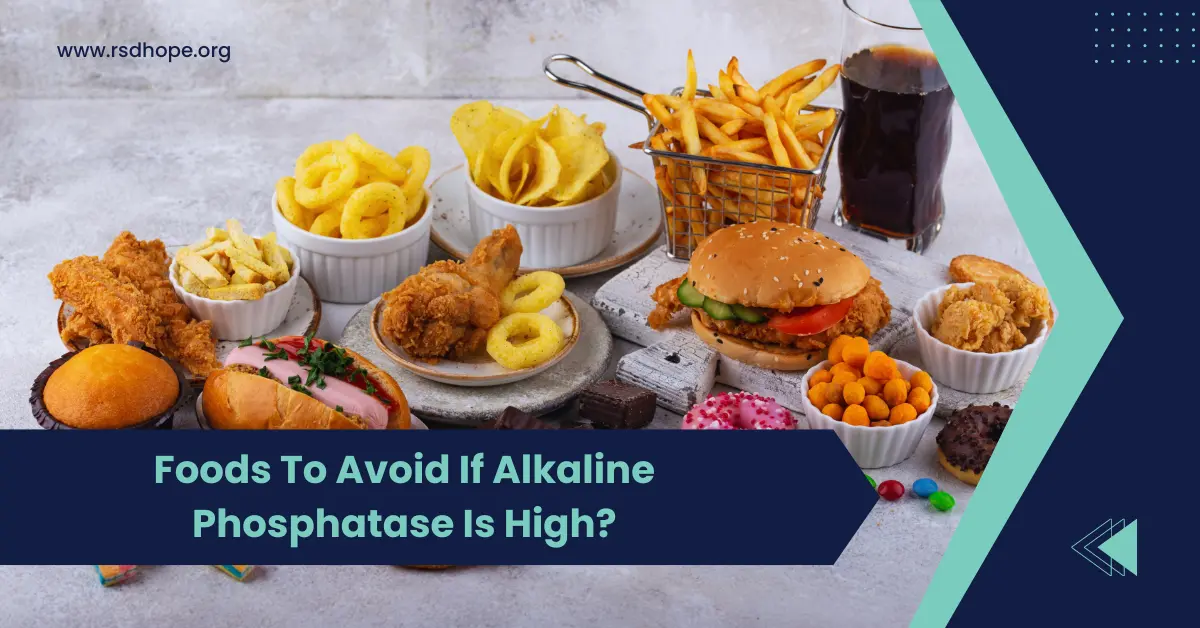Alkaline phosphatase (ALP) is an enzyme found in various tissues throughout the body, including the liver, bones, and kidneys. While ALP plays a crucial role in many bodily functions, elevated levels can be a cause for concern. If you’ve been diagnosed with high alkaline phosphatase, making dietary changes can be an essential step in managing your condition. In this article, we’ll explore the foods to avoid if your alkaline phosphatase levels are high, and provide you with tips for maintaining a healthy, balanced diet.
Key Takeaways
- Certain foods, such as dairy, processed foods, and red meat, can contribute to high ALP levels.
- Making dietary changes and choosing healthier alternatives can help manage alkaline phosphatase levels.
- Consult with a healthcare provider or nutritionist for personalized dietary recommendations.
9 Foods To Avoid if Alkaline Phosphatase is High
1. Dairy Products
Dairy products, such as milk, cheese, and yogurt, can contribute to high alkaline phosphatase levels. If you’re looking to lower your ALP levels, consider reducing your dairy intake or opting for plant-based alternatives like almond milk, soy milk, or coconut yogurt.
2. Processed Foods
Processed foods, including packaged snacks, frozen meals, and fast food, can negatively impact alkaline phosphatase levels. These foods often contain high amounts of sodium, sugar, and unhealthy fats, which can exacerbate ALP issues. To avoid processed foods, focus on consuming whole, unprocessed ingredients and preparing meals at home.
3. Red Meat
Red meat, such as beef, pork, and lamb, should be limited if your alkaline phosphatase levels are high. Instead, opt for plant-based protein sources like legumes, tofu, and tempeh, or choose lean meats like chicken and turkey in moderation.
4. Sugary Foods and Beverages
Sugar can contribute to elevated alkaline phosphatase levels, so it’s essential to limit your intake of sugary foods and beverages. Instead of reaching for candy, cookies, or soda, satisfy your sweet tooth with naturally sweet fruits, like berries or apples, or choose low-sugar alternatives like stevia or monk fruit sweeteners.
5. Alcohol
Alcohol consumption can affect alkaline phosphatase levels, so it’s best to reduce or eliminate alcohol intake if your ALP is high. If you do choose to drink, opt for low-alcohol options like light beer or wine spritzers, and always consume alcohol in moderation.
6. Caffeine
Caffeine, found in coffee, tea, and energy drinks, has been linked to high alkaline phosphatase levels. If you’re looking to lower your ALP, consider reducing your caffeine intake or switching to decaffeinated options. Herbal teas and water are excellent alternatives to keep you hydrated without the added caffeine.
7. High-Fat Foods
High-fat foods, particularly those high in saturated and trans fats, should be limited in cases of high alkaline phosphatase. Instead of fried foods, processed snacks, and fatty meats, choose healthier fats like avocados, nuts, seeds, and olive oil.
8. Acidic Foods
Acidic foods, such as citrus fruits, tomatoes, and vinegar-based dressings, can impact alkaline phosphatase levels. While you don’t need to eliminate these foods entirely, it’s essential to maintain a balance and include alkaline options like leafy greens, root vegetables, and herbal teas.
9. Sodium
High sodium intake can contribute to elevated alkaline phosphatase levels. To reduce your sodium intake, avoid processed foods, limit your use of table salt, and opt for herbs and spices to flavor your meals instead.
Conclusion
Managing high alkaline phosphatase levels through dietary changes can be a powerful tool in promoting overall health and well-being. By avoiding or limiting foods that can contribute to elevated ALP, such as dairy, processed foods, red meat, and sugary beverages, you can take an active role in managing your condition.
However, it’s essential to remember that everyone’s nutritional needs are unique, and it’s always best to consult with a healthcare provider or nutritionist for personalized dietary recommendations.
FAQs
A: While you may need to limit certain foods, you can still enjoy a variety of delicious and nutritious options. Focus on whole, unprocessed foods and experiment with new recipes to find healthy alternatives to your favorite dishes.
A: The time it takes to see improvements in ALP levels can vary from person to person. According to the National Institutes of Health, it may take several weeks or months to see significant changes. Be patient and consistent with your dietary modifications, and work closely with your healthcare provider to monitor your progress.
A: Some studies suggest that vitamin D and magnesium supplements may help regulate alkaline phosphatase levels. However, it’s crucial to consult with a healthcare professional before starting any new supplement regimen, as they can assess your individual needs and potential interactions with other medications.
A: In most cases, completely eliminating certain foods is not necessary. The key is to find a balance and make informed choices. Work with a healthcare provider or nutritionist to develop a personalized meal plan that takes your unique needs and preferences into account while still supporting healthy alkaline phosphatase levels.

